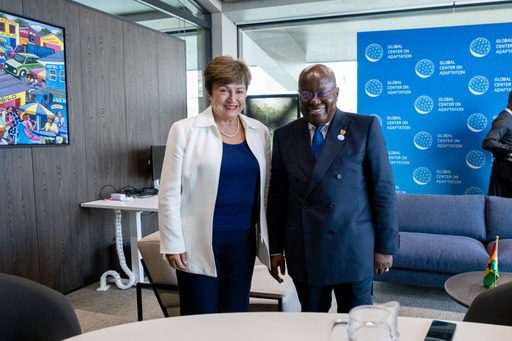The International Monetary Fund (IMF) has projected a 2.8% Gross Domestic Product for Ghana in 2023, as it expects the growth rate in 2024 to be better. The Fund is anticipating a rebound in the Ghanaian economy in 2024.
This is due to expected improve economic activities, particularly in the extractive sector, which will boost growth. But, the sub-Saharan Africa’s growth is projected to remain moderate at 3.8% in 2023 amid prolonged fallout from the COVID-19 pandemic, although with a modest upward revision since October, before picking up to 4.1% in 2024.
“On Ghana, we do expect growth to slow this year. This is partly because of the global headwinds that Pierre Olivier [Chief Economist and Director Research Department] has been discussing. So, it’s a difficult time for the global economy to affect Ghana”, Division Chief at the Research Department, Daniel Leigh, said when answering questions from the press at the just ended World Economic Forum in Davos, Switzerland.
“But also, there are some domestic headwinds. In particular, inflation has increased significantly. And so, the Central Bank is tightening monetary policy, but that is cooling the economy domestically. Plus, the fiscal policies are tightening to address the elevated debt. This is the cooling in 2023”, he pointed out.
“But in 2024, we see a rebound in particular in the extractive activities. And that is going to support Ghana in 2024”, he added.
Mr. Leigh also spoke of the $3 billion extended credit facility that Ghana is seeking from the IMF, saying, “The goal of that program is to reestablish macroeconomic stability, debt sustainability, and create the foundations for higher and inclusive growth over the medium-term”.
“I would add that right now — so just very recently — the IMF team went to Ghana, reached agreement with the Ghanaian authorities on an economic reform program that will be supported under a $3 billion extended credit facility. And the goal of that program is to reestablish macroeconomic stability, debt sustainability, and create the foundations for higher and inclusive growth over the medium-term”.
The January 2023 World Economic Outlook indicates that, the small upward revision for 2023 (0.1 percentage point) reflects Nigeria’s rising growth in 2023 due to measures to address insecurity issues in the oil sector.
In South Africa, by contrast, after a COVID-19 reopening rebound in 2022, the IMF projected growth more than halves in 2023, to 1.2 percent, reflecting weaker external demand, power shortages, and structural constraints.
Meanwhile, global growth, estimated at 3.4% in 2022, is projected to fall to 2.9% in 2023 before rising to 3.1% in 2024.
Compared with the October forecast, the estimate for 2022 and the forecast for 2023 are both higher by about 0.2 percentage point, reflecting positive surprises and greater-than-expected resilience in numerous economies.
Negative growth in global Gross Domestic Product or global GDP per capita—which often happens when there is a global recession—is not expected.
Nevertheless, global growth projected for 2023 and 2024 is below the historical (2000–19) annual average of 3.8%.
The forecast of low growth in 2023, the report, said reflects the rise in central bank rates to fight inflation–– especially in advanced economies––as well as the war in Ukraine.




























